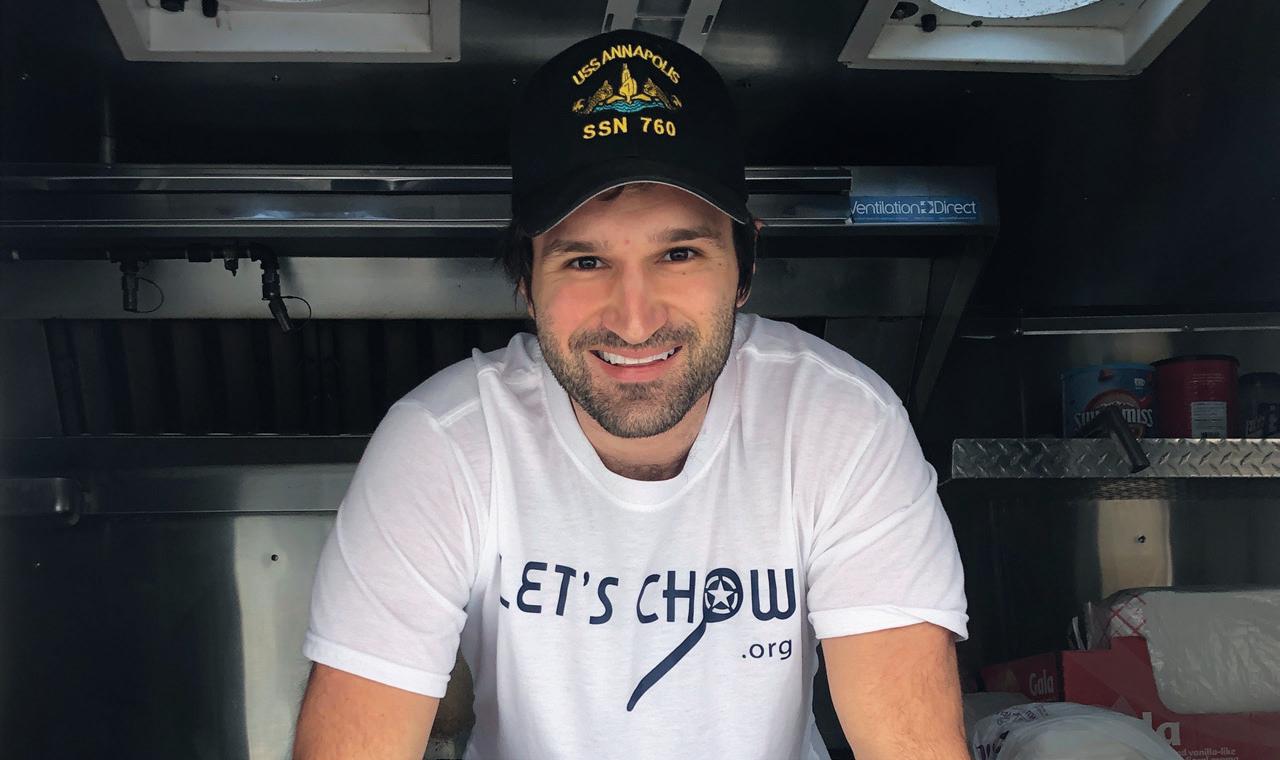
5 minute read
ALUMNI NEWS
Jordan Foley (L’21) founded ChowCorp, a nonprofit that helps veterans become food truck or restaurant owners, in 2020.
Photo: Charlie Magovern
Photos: Georgetown Athletics
Serving up support for veterans
In 2019, Jordan Foley (L’21) was studying at Georgetown Law when he received devastating news: a friend and fellow Navy veteran had died by suicide while struggling with debts as he launched his startup business. “After looking into it, I asked, why weren’t there resources available for him? Did he not have support? How can we reduce those startup fail rates?” he says. “I knew there were many nonprofits helping veterans start businesses, but I wanted to help them longterm. I wanted to honor my friend.” He began considering his longtime passion for food as a pathway to business ownership. Foley has long been aware of food’s power to connect generations and cultures. He remembers standing on a footstool when he was young, watching his grandmother as she cooked. He remembers sharing a homemade deep dish pizza with a Navy member he didn’t know well in a submarine thousands of feet below the sea. He remembers a friend’s grandmother in China handing him a plate of dumplings and squeezing his shoulder when he felt alone during an overseas stint. “I decided to hyper-focus on the culinary industry so that we can take a veteran from zero knowledge to business ownership,” he says. “I want them to be able to start a business with a safety net.” Foley started with a food truck as his training ground. He designed a curriculum to help veterans and their spouses gain business and culinary training by running their own food trucks. He pitched the idea at the Georgetown Entrepreneurship Challenge and came in first for Georgetown Law. Using resources from the law school, he launched ChowCorp in 2020. It provides cooking therapy, cookware donations, culinary education, and business advice for aspiring food truck or restaurant owners. Three months after he launched, the COVID-19 pandemic hit. Foley switched his model to partnering with veteran-owned businesses to fund cooking free meals on his food trucks for those who needed them. Eventually, he pivoted back to his original model. ChowCorp has since graduated four participants from its Food Truck Training Program in Annapolis, Maryland. Foley’s next cohort will involve 15 participants working in food trucks in California, New Jersey, and Maryland. He hopes to continue expanding his program and partnerships. Foley runs ChowCorp at night after his day job as a Navy attorney. He doesn’t consider himself an entrepreneur. Instead, he says, helping veterans like his friend is what drives him. “It gets back to being a person for others,” he says. “I can’t put monetary value on it. I do this for my friend. I do this for veterans. If nobody is fighting for these people trying to start their own businesses, who better than us to fight for their success.” • —Rosemary Lane
CEO alumnus helps create experiential learning opportunity
In February 2021, Alan Gould (SFS’83, Parent’25), founder and CEO of the AI marketing startup MutualMarkets, pitched a “crazy idea” to Georgetown. He wanted to give students experience in real-time problem solving at a startup. Six weeks later—in partnership with professors Jeff Reid and Randy Bass—Gould’s vision came to life in the form of the Entrepreneurship Journey Fellowship, an experiential learning course. “I was trying to bridge the gap between an internship and academic knowledge, and I was in a unique position to advance this idea,” Gould says. “I asked my team if they would agree to be observed in real time, and then share the challenges that the company was facing.”
Bass, vice president for strategic education initiatives and leader of the Red House incubator for curricular transformation, described the course as a “microcosm of porous teaching between the classroom and real-world activity.” He says the course provided real-time learning, the ability to engage with alumni expertise, an opportunity to be on the inside of the process, and flexibility of modality between the classroom and Zoom. “It was also an experiment that was very much of the pandemic adaptation moment.” Gould credits the professors he had as a student in the School of Foreign Service for pushing him to think differently. He has served on the School of Foreign Service Board of Advisors for a number of years, and after judging the “Bark Tank” alumni pitch competition at John Carroll Weekend in Seattle in 2018, he began considering ways to incorporate entrepreneurship into the wider Georgetown curriculum. “Entrepreneurship, at its core, is a way of thinking,” Gould says. “Academic programs in diplomacy or international relations could benefit from creativity, innovation, and risk-taking.” Both undergraduate and graduate students have taken the course from across Georgetown McDonough, the SFS, the College, and the School of Continuing Studies, and several from the first cohort have stayed involved as teaching assistants for the second and third cohorts.
Students engage asynchronously with MutualMarkets— a fully remote company that holds meetings in virtual reality—via weekly video recordings and may soon interview employees via VR headsets. They have researched how to raise the startup’s next round of venture capital and how to approach a different market segment, and presented possible answers to both challenges. Additionally, the students have explored ethical dilemmas, such as how to balance empathy and responsibility when letting go of an employee. “Georgetown’s version of the entrepreneurial mindset includes values-based entrepreneurship,” says Reid, founding director of the Georgetown University Entrepreneurship Initiative. “The Entrepreneurship Journey Fellowship allows students to walk slowly and thoughtfully through some of these decisions, because that’s where values meet the world.”
Reid credits alumni donors for helping make curricular innovation possible. “We could not have created this course, and delivered this experience for our students, without the philanthropic support that’s been provided by alumni through the Red House,” he says, crediting philanthropy with facilitating programs that are “new and creative and outside the norm.” •
—Kate Colwell
Image: iStock







